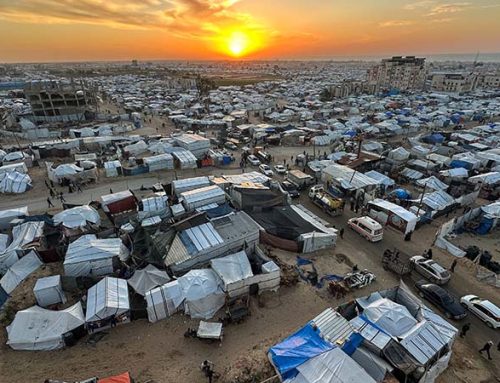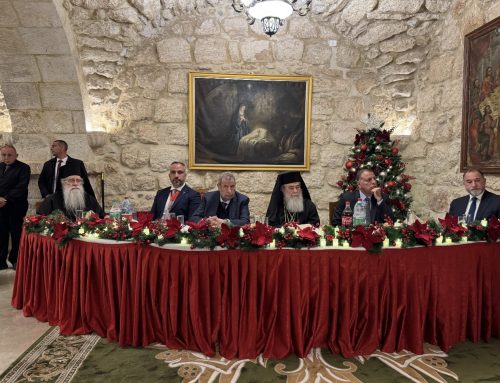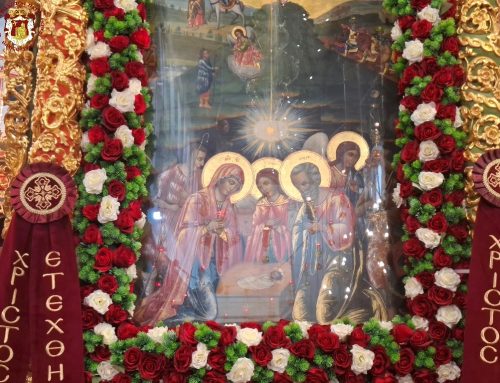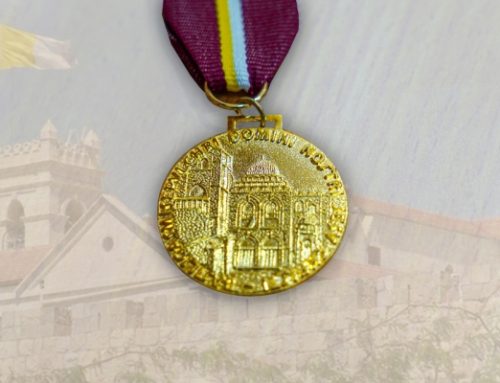Zenit
New Jerusalem Auxiliary Looks at Upcoming Synod
The 14 million Christians who live in the Middle East, despite difficulties and persecutions, have a mission to fulfill in their respective countries to foster peace and coexistence.
This is one of the topics addressed by the recently appointed auxiliary bishop of the Patriarchate of Jerusalem, Bishop William Shomali, during an address he gave last Thursday in preparation for the forthcoming special synod on the Middle East.
Some 140 religious who work in the Latin Patriarchate and who have cooperated in the preparation of the synod attended the conference.
Bishop Shomali stressed the need for Christians of the Middle East to see their presence as a vocation, avoiding being shut in a “ghetto mentality,” which might lead increasingly to their social insignificance.
In the conference, titled “The Middle Eastern Synod in its Geopolitical and Pastoral Context,” the new auxiliary bishop of Jerusalem analyzed the situation of minorities in each country.
He noted that from Turkey to Egypt and from Syria to Iraq, the situation of Christians is increasingly difficult, due on one hand to emigration and on the other to the ascent of a political Islam that wants to dominate Arab societies.
The bishop reflected how the concrete situation of greater or lesser tolerance depends on each country — from total intolerance in Saudi Arabia to liberty of worship in Jordan — yet Christians live in societies where there is no genuine liberty of conscience, and in which their presence is tolerated more than welcomed.
Fewer Christians
The greatest problem Christian communities face is that of their own subsistence, since for now more than 100 years there has been an uninterrupted exodus of Christians. To the phenomenon of emigration is added the genocide of Maronites (1860), of 1.5 million Armenians by Turkey (1912), the war in Lebanon (1975-1990) and the instability in Iraq (since 1990), explained Bishop Shomali.
This emigration has not only “weakened the fabric of Christian life,” he said, but has also “opened the eyes of moderate Muslims who see in this exodus an impoverishment of Arab society and the loss of moderate elements. Many Palestinians intellectuals — including Faisal Husseini, the current Grand Mufti of Palestine, Tayseer Tamimi, the Grand Magistrate, President Mahmoud Abbas and Prime Minister Salam Fayyad — have said that the departure of Christians has been a loss for all Palestinians and will end up setting Jewish and Muslim extremism face to face.”
In this connection, he continued, “Christians have their contribution to make in resolving political or religious conflicts,” but to do so they must participate more actively in public life.
Vocation
Bishop Shomali stressed that Christians who live in the Middle East are rooted in a culture and language, and live with other peoples with whom they share a language, a history and many traditions.
“Christians should not feel that they are foreigners,” he declared. “They are called to be witnesses of Christ in those countries where they live. To flee their countries of origin means to escape reality.”
Hence, he urged Christians “to live with faith and joy in the land of their ancestors.”
The bishop asserted that the “faithful expect their pastors give them clear reasons for their mission in each country. It is not for us to be anything other than authentic witnesses of the Risen Christ present in his Church through the Holy Spirit, in those countries where we were born and where we live, countries that are characterized not only through a process of political and democratic maturation, but, unfortunately, also by conflict and instability.”
He pointed out that a factor that could limit emigration would be to make Christians “more aware of the meaning of their presence and the need to engage, here and now, in public life. Everyone in his own country bears the message of Christ to his society. This message is to be carried forward even in difficulties and persecution.”
Ecumenism
Bishop Shomali also considered Christians’ spiritual life and, in particular, the question of unity.
On one hand, he stressed the importance of forming the faithful in knowledge of the Scriptures, exactly as proposed by the 2008 synod. “In the Middle East there is a lot of piety and much popular devotion. But the Word of God has not yet taken its rightful place in the spirituality of the Christian people,” he contended. “The Holy Scriptures, written in our land and in our languages — Hebrew, Aramaic and Greek — with literary and cultural expressions that we feel as our own, will guide our thinking.”
The bishop also spoke of unity with the Eastern Churches: the Melkites, Syrians, Maronites, Copts, Armenians and Chaldeans.
“These churches need to live their liturgical and linguistic particularity on the one hand, and a greater communion among themselves on the other. Currently, this communion leaves something to be desired,” he said.
On the other hand, the prelate referred to the relationship between the Catholic and Orthodox Churches, stating with the synod working document that the divisions between the Churches of the Middle East “are the bitter fruits of the past, but the Spirit works with the Churches to bring them together and break down barriers to that visible unity willed by Christ.”
In sum, the Church “does not claim to offer prefabricated solutions to all the problems facing Christians living in the Middle East,” Bishop Shomali concluded. But the prelate stressed that the task of the Church is in indicating “the places and ways to arrive at the solution to these problems.”





